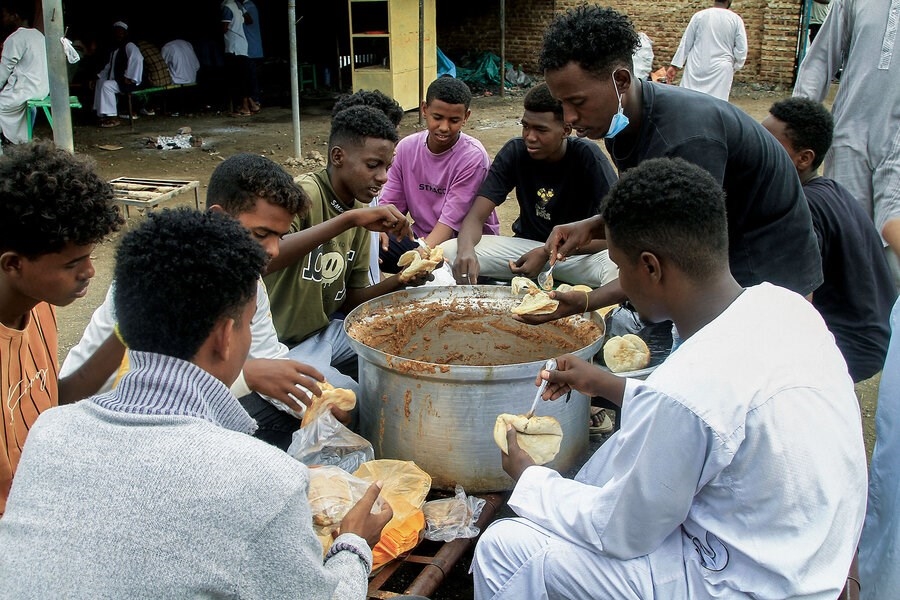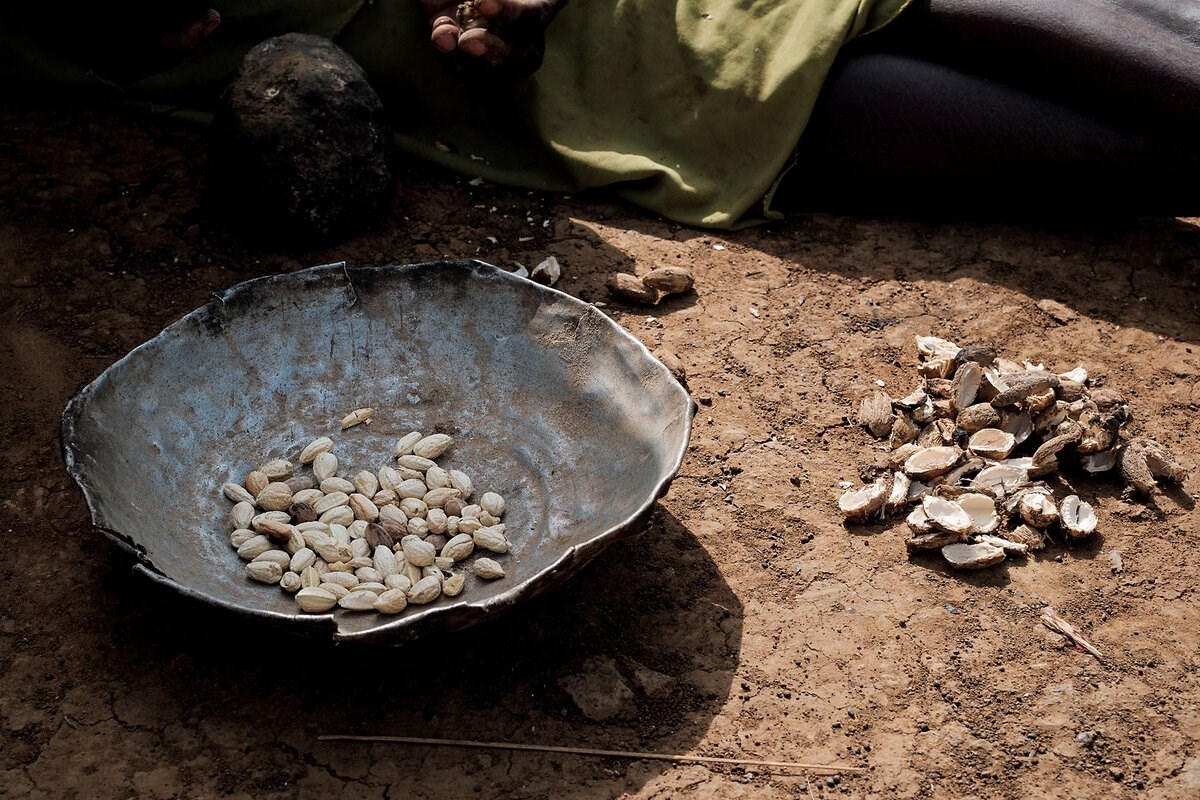REPRINTED WITH PERMISSION FROM THE CHRISTIAN SCIENCE MONITOR
A network of community aid groups is providing pivotal support for communities affected by Sudan’s civil war. By doing so, they are also showing that the ties that bind Sudanese together are stronger than the violence tearing their country apart.
 Volunteers provide meals at a displacement camp in Gederef, Sudan, July 13, 2024. Hunger is an ongoing challenge for half of the Sudanese population.AFP/Getty Images
Volunteers provide meals at a displacement camp in Gederef, Sudan, July 13, 2024. Hunger is an ongoing challenge for half of the Sudanese population.AFP/Getty Images
|Abuja, Nigeria
This is the second of four articles from Sudan that we are publishing this week, highlighting that country’s travails and citizens’ efforts to overcome them. Read the first one here.
As volunteers chopped onion and cubed lamb on a recent morning at the Abu Shouk displacement camp in Darfur, their goal was simple: to feed the hungry.
The fragrant rice dish they were preparing that day, known as lamb kabsa, was enough for 3,000 of the camp’s residents. In El Fasher, a city suffering from the world’s first confirmed famine since 2017, that meal had life-and-death stakes. But for the volunteers, it also carried profound symbolism.
“Sharing food with people is deeply rooted in Sudanese culture,” explains Salah Adam, a volunteer with Abu Shouk’s “emergency response room,” the local aid group that organizes the daily soup kitchen here. “Before the war, we used to eat our meals outside our homes and invite passersby to eat with us.”
Now, in this improvised city of tents and mud-brick houses, sharing a meal became a small tether to that old life.
Since war broke out between two factions of Sudan’s military in 2023, the conflict has been unsparingly devastating for civilians. Among other crises the war has generated, half of Sudan’s population regularly does not have enough to eat, and 8.5 million people are facing what global experts call a hunger emergency.
With international appeals for assistance severely underfunded and aid delivery repeatedly restricted by fighting, emergency response rooms have stepped in across the country to fill the gaps. The group's efforts earned them a nomination for the Nobel Peace Prize, and a spot on at least one prestigious unofficial shortlist.
Through their work, they are also forcefully asserting that the Sudanese people’s solidarity is stronger than the violence that has engulfed their country.
“They are our people: our family, our friends, and our neighbors,” says Waleed Khojali, who like others in this article spoke to the Monitor by phone from Sudan. He is a volunteer at a network of emergency response rooms in the East Nile area of the capital, Khartoum, that together serve more than 20,000 people daily at 150 soup kitchens. “Someone has to lighten them up and give them hope in the midst of this war. We believe it is our duty.”
The civil war began in April 2023, the result of a violent power struggle between the country’s two top generals. Emergency response rooms began springing up soon after.
But the tradition of Sudanese communities rallying behind each other in times of crisis is much older. There’s even a word for it: nafeer, which means “call to mobilize” or “collective work.”
Nafeer is about “social solidarity,” explains Ismael Hagana, founder of Global Aid Hand, a nonprofit that provides aid to displaced Sudanese. In times of struggle – from natural disasters to wars to pandemics – nafeer asks Sudanese to help “those in need, especially the most vulnerable.”
 Guy PetersonA woman sorts the fruit of the kudra plant to prepare a meal at a camp for displaced people in Kadugli, Sudan, June 18, 2024.
Guy PetersonA woman sorts the fruit of the kudra plant to prepare a meal at a camp for displaced people in Kadugli, Sudan, June 18, 2024.
For many young Sudanese, nafeer was a central part of the future they imagined when they poured into the streets in 2018 and 2019 to protest the rule of Sudan’s longtime dictator, Omar al-Bashir.
Those protests eventually unseated Mr. al-Bashir, but then the military-run transitional council that replaced him refused to cede power. Last year, a power struggle within that council exploded into war between Sudan’s armed forces and the paramilitary group known as the Rapid Support Forces.
As the war spread, young pro-democracy activists and other community organizers began a new form of nafeer. Although there is no precise data on the number of active emergency response rooms, a year and a half into the war, they are known to be operating in at least half of Sudan’s 18 states.
Largely funded by donations solicited on social media from Sudanese at home and in the diaspora, the emergency response rooms respond to a wide variety of community needs. These include repairing downed electrical lines, organizing evacuations, and filling the gas tanks of ambulances.
But there is one constant: Every room operates at least two community kitchens.
The setup of these kitchens varies, but they typically enlist local volunteers to purchase, prepare, and distribute one simple daily meal to those in need.
“You cannot imagine how excited children get whenever they see us from afar with food in donkey carts,” says Mr. Adam, the emergency response volunteer in Abu Shouk. He has lived in the camp since the mass killings in Darfur forced him from his own home in 2003. In the past year, this and other camps in the area have swelled as millions have been forced to flee fighting once again.
It hardly matters, he says, that one serving of food must often be shared among as many as five people. They are just grateful that “What could be their only meal for the day has arrived.”
Indeed, for many, this daily meal is a lifeline. Hunger is an constant for some 26 million Sudanese – half the population – and no less than 3.7 million Sudanese children under the age of 5 are experiencing life-threatening malnutrition. In early August, famine was declared in Zamzam, a displacement camp near Abu Shouk, and experts warn that nearly 800,000 Sudanese are currently facing “catastrophic” hunger, which is characterized by “starvation, death, and destitution.”
This crisis is entirely human-made. Fighting has forced millions of Sudanese to abandon their farms, food aid convoys have been attacked, and for six months this year, the Sudanese military sealed off a major border crossing from Chad, severely restricting aid delivery.
In Abu Shouk, these conditions often force community kitchens to make hard choices. When there isn’t enough food, volunteers prioritize feeding children first.
Emergency response rooms have also been caught in the crossfire. Volunteers report that they have been accused by both sides in the conflict of working for the other.
“We can’t guarantee the safety of volunteers who go to the market or cook in the kitchen,” says Mr. Khojali, the Khartoum volunteer. He says three volunteers were killed in their houses, and 15 others were recently detained and tortured for two weeks by the Rapid Support Forces under suspicion that they were working with the Sudanese military. These accounts could not be independently verified by the Monitor.
But these challenges have not stopped emergency response room volunteers, many of whom see the work as a calling.
“We have limited resources,” explains Ismail Ibrahim, a volunteer at the emergency response room in Shagra, a village near El Fasher in Darfur. Still, he says, “We want everyone to have something to eat, no matter how little.”
Part 1: A journalist recounts his daughter’s miraculous birth in war-torn Sudan
Page created on 10/27/2024 3:21:25 PM
Last edited 10/27/2024 3:30:16 PM
